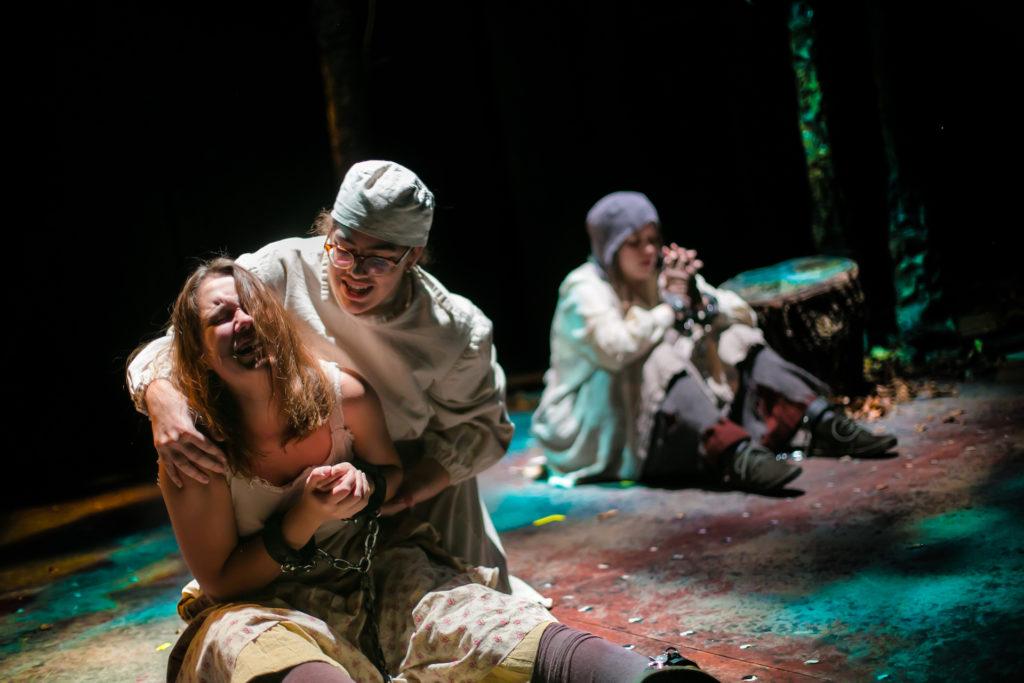By Sophie Cannon, deputy arts & entertainment editor
Halloween has come and gone, but the witches decided to stay at Northeastern this year, spending November in the Studio Theatre. Northeastern’s theatre department’s new show, “Vinegar Tom,” is a play about the 17th-century witch hunts in London, but also about modern feminism and women’s rights, bringing the show to a new and timely level.
“It’s about witches, but not really focused on witches,” said Monica Cole, a senior theatre major. “We’ve been throwing around the term, ‘a feminist play.’ But I don’t want to say it’s about witches; it’s not really what that play is about. It’s a story about 17th century England when women were being accused of being witches but beneath all of that it really is an examination of the treatment of women.”
The first thing one notices when walking into the intimate space of the Studio Theatre is the set. The stage is centered around a treehouse-type structure, with varying levels, and then a smaller house on the opposing side. The set serves more of a purpose than just a platform for the actors, as it is also serving as a metaphorical hierarchy, explained more as the play goes on.
“The set also speaks to not class, but status, in the sense that the woman who is perceived to be the known witch is at the very top, the accusers are at the middle and the others are at the bottom,” said Lauren Teixeira, a sophomore theatre major playing Susan, one of the characters in the play. “It kind of speaks to social standing and how that affected if you were a witch or not. The very top and the very bottom were the ones that got accused.”
The inclusion of live music, performed by the same actors but not as their designated time-period roles, sets this production apart from a traditional period piece. The actors change out of their petticoats and into leggings and t-shirts during these interludes, bringing the show in and out of modernity. Throughout the show, musical interludes help to not only engage the audience, but to provoke thoughts on the deeper meaning of the show.
“We have live music, to serve directly to the audience,” said Jessica Halem, stage manager and senior majoring in theatre production and media and screen studies. “Using the idea of the Northeastern community and us as people working on the show, what we are saying through this play is trying to speak directly to the audience and the live music is the vehicle for that.”
Though the show is set in the 17th century, there are many elements that lean towards modernity, such as its depiction and treatment of women. The show itself is not a political critique or intended to have a 21st century feeling, but the cast, as well as other members of the production, have been noticing and even using their text-to-world connections to get even deeper into their characters and the show.
“Look at the election,” Teixeira said. “Hillary Clinton is being defined by her position in relation to her husband. In the third debate, they started referring to her as Mrs. Clinton, and that was extremely disrespectful to her because that’s not her highest position. Look at this woman in a position of power, and how hard, not just the Trump campaign, but society is trying to tear her down.”
Agreeing with Teixeira, Halem not only viewed this treatment of women as an election issue, but an issue embedded in the media and even in our everyday lives.
“What these women in the play are called and how they are being attacked sounds a lot like what’s being said in the press these days and even on the sidewalk and how much of that is still there,” Halem said. “It reinforces that this issue hasn’t gone away, and we need to take action against it. Hopefully that’s what the end of the show leaves you with. We can’t just sit and wallow. We have to stand up and do something.”
Regardless of political leanings or views on feminism, the show’s aim is to make you feel something and think about why you are feeling it, according to Halem. Through the set, the music and the thought provoking dialogue, these themes are laid out and call for the audience to really think about them and what they mean for our future.
“This show is one that you leave thinking, ‘Oh, this is the message,’ not us standing up there saying ‘This is a feminist play look at this,’” Teixeira explained. “We want you to leave the theater thinking ‘Oh, that was really good but wow I have a lot of thinking to do.’”
“Vinegar Tom” will be in performance at Northeastern’s Studio Theatre through Nov. 20. Tickets can be purchased online through myNEU.
Photo Courtesy Grant Terzakis









